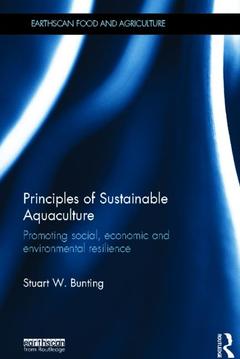Description
Principles of Sustainable Aquaculture
Promoting Social, Economic and Environmental Resilience
Earthscan Food and Agriculture Series
Author: Bunting Stuart W.
Language: English
Subjects for Principles of Sustainable Aquaculture:
Keywords
development; east; kolkata; wetlands; wastewater; systems; production; shellfi; meal; integrated; Aquaculture Development; Pr Om; Es Ta; Local NGO Partner; Sustainable Aquaculture Development; EKW; Te Ch; Sustainable Aquaculture Practices; St Em; Sustainable Aquaculture; Aquaculture Wastewater; Aquatic Vegetable; Semi-intensive Pond; River Prawn; Aquaculture Systems; Mahakam Delta; Bioeconomic Modelling; GIAHS; Artificial Reefs; Rice Fish Culture; Tamil Nadu; Rorippa Nasturtium Aquaticum; Sustainable Livelihoods Framework; Integrated Aquaculture Agriculture; Stock Enhancement
Publication date: 12-2012
Support: Print on demand
Replaced by new edition: Access to the new edition.
Publication date: 12-2012
288 p. · 15.6x23.4 cm · Hardback
Replaced by new edition: Access to the new edition.
Description
/li>Contents
/li>Readership
/li>Biography
/li>
Aquaculture is the farming of aquatic organisms, principally fish, molluscs, crustaceans and marine algae. It has seen phenomenal worldwide growth in the past fifty years and many people view it as the best solution for the provision of high quality protein to feed the world's growing population, particularly with the rapid decline in wild marine fish populations. Aquaculture now contributes approximately one third of the world's fish production, and has increased by about eight per cent annually over the last thirty years, while wild capture fishery production has remained static.
Focused on developing more sustainable aquaculture practices, this book provides an ideal advanced-level textbook. It is based on extensive evidence and knowledge of best practices, with guidance on appropriate adaptation and uptake in a variety of environmental, geographic, socio-economic and political settings. The author concentrates on low-impact aquaculture systems and approaches, which have minimal adverse effects on the environment. He also emphasizes socially responsible and equitable aquaculture development; to enhance the natural resource base and livelihoods.
Drawing on a range of case-studies from around the world, the objective is to show where progress in terms of developing ecologically sound and socially responsible forms of aquaculture has been made. A tool-box of approaches to support widespread adoption and appropriate adaptation of regenerating aquaculture strategies is provided, ensuring the book will have practical relevance for both students and professionals.
1. Introduction 2. Resource Conserving and Enhancing Aquaculture 3. Equitable Aquaculture Development 4. Sustainable Coastal Aquaculture 5. Sustainable Rural Aquaculture 6. Sustainable Urban and Peri-urban Aquaculture 7. Prospects for Sustainable Aquaculture Development 8. Promoting an Enabling Environment. 9. Conclusions
Stuart W. Bunting completed his doctoral studies at the world-renowned Institute of Aquaculture, University of Stirling, UK in 2001 and continued working at the Institute on various aquaculture development projects in Europe and Asia. Since 2005 he has been based within the interdisciplinary Centre for Environment and Society, University of Essex, UK where he coordinates a wide range of research, development and conservation projects focused on sustainable aquaculture, livelihoods and aquatic resources management.




